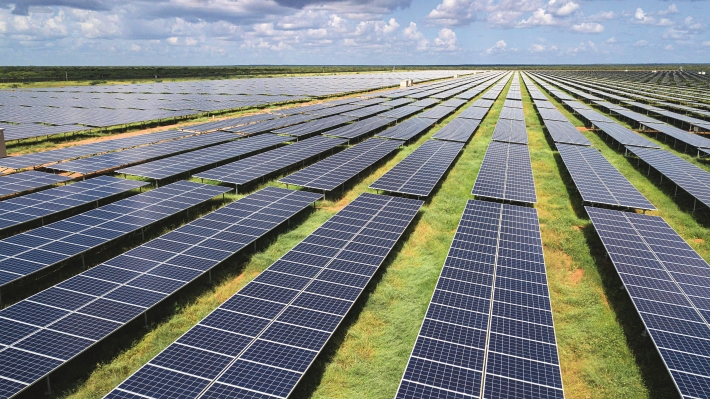|
||||||||||
| Home Top News Economy/Tech Culture/Sports China in Foreign Eyes Green Development Videos Intangible Cultural Heritages |
|
||||||||||
| Home Top News Economy/Tech Culture/Sports China in Foreign Eyes Green Development Videos Intangible Cultural Heritages |
| ChinAfrica |
| Green Energy Revolution |
| Kenya to benefit from Chinese renewable energy companies setting up their bases in the country |
| By Gitonga Njeru | VOL. 16 September 2024 ·2024-09-02 |

Photo taken on 16 October 2023 shows the construction of Chinese built Thwake Multipurpose Dam in Kenya (XINHUA)
Aden Barrow, 45, lives in Garissa, a town in North Eastern Province of Kenya. His entire household relies on renewable energy for daily electricity needs, not only to irrigate crops on his 1.2-hectare farm, but also for his home.
“Solar irrigation helps me produce larger amounts of crops such as tomatoes, bananas, mangoes and kale. I then sell to neighbouring supermarkets and hotels. I am connected to the national grid. I also have biogas from animal waste, mostly cows and pigs,” said Barrow, who added that crops cultivated from clean energy attract lots of customers who are becoming conscious of environmental protection.
Chinese solar initiative
Barrow’s solar supply and equipment are provided by the Chinese company Jinko Solar, in collaboration with China Jiangxi International Economic and Technical Cooperation Co. Ltd.
The nearby plant provides electricity to approximately 70,000 homes in the town. This 54.64-mw solar power plant is one of the largest in East Africa and contributes significantly to the region’s renewable energy supply.
Meanwhile, by the end of this year, Chinese renewable energy companies such as Shenzhen Power-Solution, Esavior Green Energy and Jinko Solar plan to establish their regional headquarters in Nairobi. This will help to boost the country’s renewable energy capacity by an additional 3,000 mw, according to Alex Kamau Wachira, Principal Secretary in Kenya’s Ministry of Energy and Petroleum, who said the companies had regular meetings with the Kenyan government, leading up to the headquarters’ decision.
Meanwhile, Kenya’s green energy players urged Chinese business owners to invest in Kenya and the continent’s renewable energy for sustainable development during the 2023 China-Africa Sustainable Investment Summit in Nairobi last year, where Chinese businesspeople gathered looking for investment opportunities.
“There are future partnerships between Kenya and China. Kenya’s economy is growing despite many economic challenges. There are also several Kenyan companies in China that are flourishing,” said Zhou Pingjian, Chinese ambassador to Kenya. “Kenya’s energy sector is the pillar to its economic growth and development. It is an example to the region.”
Kenya’s Deputy President Rigathi Gachagua held talks on 2 July with the Chinese ambassador ahead of his visit to China. The deputy president said the discussions were focused on “cross-cutting priority areas of common interests between the two nations, including enhancing trade and investment. “Kenya and the People’s Republic of China enjoy cordial and fraternal relations based on mutual trust and benefit, especially in trade and development,” said Gachagua.
Meanwhile, Wachira said the intersection of international investment in renewable energy and Kenya’s ambitious energy goals highlights significant economic and environmental impacts.
“Close to 90 percent of Kenya’s energy supply is renewable energy. We get energy from hydro, geothermal, solar plants and animal waste. We hope to reach 100 percent within the shortest possible time,” said Wachira, adding that plans are underway to phase out diesel generators and increase reliance on clean energy alternatives.
The advancements in renewable energy also resonate with global concerns about climate change and sustainable development.

Photo taken on 13 December 2019 shows a solar power farm in Garissa, Kenya (XINHUA)
Renewable power changes lives
Wachira is enthusiastic about the progress made in Garissa Town.
“Garissa is a beacon of hope for renewable energy in Kenya, showcasing how solar power can transform lives and communities,” said Wachira. “The town, with its significant solar power plant, is a testament to the potential of renewable energy in meeting the country’s energy demands sustainably. Also, China’s role of technology transfer is vital.”
Barrow’s experience is a microcosm of the broader shift towards renewable energy in Kenya. His ability to produce larger crop quantities, thanks to solar-powered irrigation, is not just a personal success story, but a model for other farmers in the region.
The solar irrigation system enables him to grow a variety of crops year-round, which is crucial in a region that faces periodic droughts and water shortages.
Experts say that the involvement of established Chinese companies like Jinko Solar is a critical factor in the growth of Kenya’s renewable energy sector.
These companies bring in advanced technology and significant financial investment, which are essential for the large-scale deployment of solar power projects.
“The establishment of regional headquarters [by Chinese companies] in Nairobi underscores the strategic importance of Kenya in China’s Africa strategy,” said Wachira.
He explained that China’s role in Kenya’s renewable energy sector is not limited to technology and investment, but also includes capacity building and training for local technicians and engineers. This transfer of knowledge and skills is vital for the sustainable development of the renewable energy sector in Kenya.
The Garissa solar power plant is a flagship project in this green energy revolution. It not only provides clean energy to thousands of homes, but also sets a precedent for future projects in other parts of Kenya, where solar potential is high.
The environmental benefits of shifting to renewable energy are clear. Reduced reliance on fossil fuels means lower carbon emissions, contributing to global efforts to combat climate change. For Kenya, which is highly vulnerable to the impacts of climate change, such as droughts and floods, this shift is crucial.
Economically, renewable energy projects create jobs and stimulate local economies. In Garissa, for example, the solar power plant has created employment opportunities for locals, from construction to maintenance. The increased availability of reliable electricity also supports small businesses and encourages new ventures.
Looking ahead, the future of renewable energy in Kenya is bright. Wachira said that the government’s supportive policies, coupled with international investment, are paving the way for rapid expansion.
As more regions such as Turkana County, Kitui County, Tharaka-Nithi County, Kisumu County and Marsabit County follow Garissa’s example, Kenya is set to become a leader in renewable energy in Africa.
Efforts to integrate more renewable energy into the national grid are ongoing. Projects like the Lake Turkana Wind Power Project and the Olkaria Geothermal Plant complement the solar initiatives, ensuring a diversified and resilient energy mix, according to the Ministry of Energy and Petroleum.

Workers examine facility at a geothermal power plant in Nakuru, Kenya, on 26 May 2023 (XINHUA)
| About Us | Contact Us | Advertise with Us | Subscribe |
| Copyright Beijing Review All rights reserved 京ICP备08005356号-5 京公网安备110102005860号 |